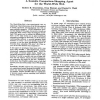100 search results - page 2 / 20 » Reducing Cognitive Overhead on the World Wide Web |
KDD
2002
ACM
14 years 5 months ago
2002
ACM
When automatically extracting information from the world wide web, most established methods focus on spotting single HTMLdocuments. However, the problem of spotting complete web s...
OTM
2005
Springer
13 years 10 months ago
2005
Springer
Abstract. The X Protocol, an asynchronous network protocol, was developed at MIT amid the need to provide a network transparent graphical user interface primarily for the UNIX Oper...
AGENTS
1997
Springer
13 years 9 months ago
1997
Springer
The World-Wide-Web is less agent-friendly than we might hope. Most information on the Web is presented in loosely structured natural language text with no agent-readable semantics...
SIGCOMM
1996
ACM
13 years 9 months ago
1996
ACM
World-Wide Web proxy servers that cache documents can potentially reduce three quantities: the number of requests that reach popular servers, the volume of network trac resulting ...
SIGCOMM
1998
ACM
13 years 9 months ago
1998
ACM
Abstract—The sharing of caches among Web proxies is an important technique to reduce Web traffic and alleviate network bottlenecks. Nevertheless it is not widely deployed due to ...

